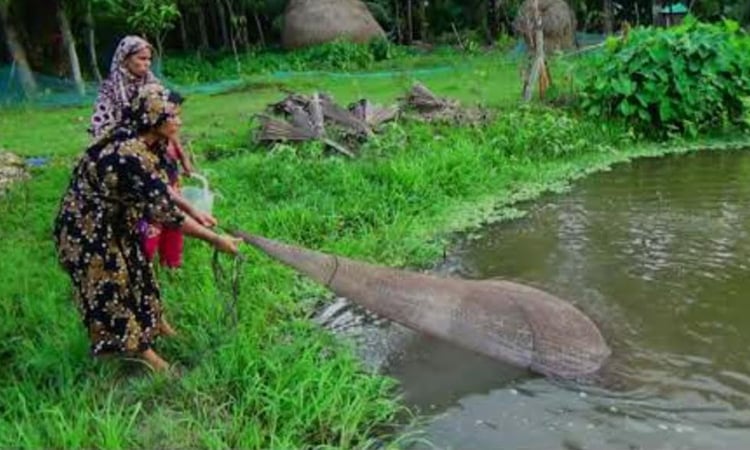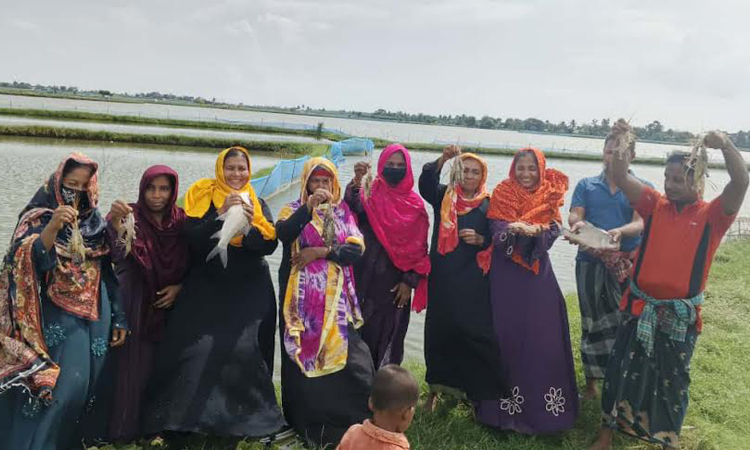News Flash
News Flash

By S M Zahid Hossain
KHULNA, Oct 15, 2025 (BSS) - Fish and shrimp farming are transforming lives in Khulna's Dumuria upazila, paving the way for self-reliance and women's empowerment in rural areas, thanks to initiatives by the Department of Fisheries.
Sabina Begum, 40, of Gonali village, is one of many women who have achieved economic independence by engaging in aquaculture. Once reliant solely on her husband's income, Sabina now runs her own shrimp farm with support from the Department of Fisheries.
"I used to depend on my husband for every expense. When I got the opportunity, I took it as a challenge. Now I earn on my own and can even save money," she told BSS.
Sabina began shrimp farming on her one-bigha pond after receiving a loan of Taka 40,000 under a coastal development project. Her husband, who previously worked as a fisherman, now supports her full-time on the farm or drives a van to supplement the family income.
"We endured hardship for over a decade with my husband's limited earnings. We struggled to pay for our children's education and medicines for my elderly in-laws. Now, those days are behind us," she said with a smile.
Across Dumuria upazila, women in villages like Gonali, Sajiara, Maguraghona, Rudaghra, and Shovna are increasingly engaging in fish farming, marking a shift from male-dominated shrimp zones to inclusive economic participation.
Sonia Begum from Araji-Sajiara village also began fish farming with a Taka 50,000 loan and training. "Earlier, our men went to the rivers to fish. Now we work in the ghers (shrimp enclosures) ourselves while ensuring our children continue their studies," she said.
In Maguraghona, Khadija Begum, vice-president of the Bagda-Golda Community-Based Organization (CBO), said over a thousand shrimp enclosures now exist in the area. "With encouragement from the fisheries office, 15 women and 10 men jointly started a new gher. We received training on modern farming, leadership, and climate resilience," she added.
Mukta Biswas, president of the Rudaghra Golda-Bagda CBO, said she leads a 25-member team and has even received advanced training in the Philippines. "All our transactions are now done through the bank. This project has opened a new horizon for women in our area," she said.
At Shovna, CBO treasurer Khadija Begum said 13 women and 12 men jointly leased a shrimp enclosure with government support. "We received hands-on training and supplies including nets, lime, fertilizers, fish feed, and post-larvae. It has boosted our confidence to transform our lives," she noted.

Speaking to BSS, Sohel Md Zillur Rahman Rigan, Senior Upazila Fisheries Officer of Dumuria, said the activities are part of the Sustainable Coastal and Marine Fisheries Project and the Community-Based Climate Resilient Fisheries and Aquaculture Development Project.
"We are providing women and fishing communities with training, loans, and technical support to make them self-reliant and climate-resilient. Many have already brought significant changes to their lives through aquaculture," he said.
He added that the success of these women has elevated their household incomes and social standing. "Those who once remained confined to their homes are now entrepreneurs, managing farms and shaping new futures," he said.
The transformation is spreading beyond Dumuria. Across Khulna's upazilas, fish farming is becoming a major income source as farmers shift from traditional rice cultivation to commercial farming of carp, tilapia, bagda, and golda shrimp.
Rexona Begum, a fish farmer from South Bedkashi in Koyra, said, "I used to rely on crop farming, but profits were low. Now, with three bighas of fish ponds, I earn about Taka 300,000 a year. It has changed my family's fortunes."
Out of approximately 5,000 hectares of aquaculture land in Khulna, the majority is dedicated to freshwater fish, with the remainder used for shrimp cultivation. Many local youth, including women, have found new livelihoods in fish farming.
Maliha Rani, a young widowed entrepreneur from Bagmara village in Rupsha upazila, said, "I was unemployed. With support from the fisheries office, I began fish farming in a pond. Now I earn regularly and even employ others."
Abdullah Al Mamun, Project Director of the Sustainable Coastal and Marine Fisheries Project in Khulna, told BSS that modern and eco-friendly techniques-such as improved water quality control, feed management, and disease prevention-are enhancing production and sustainability.
"This grassroots aquaculture revolution is revitalizing the rural economy, creating jobs, ensuring food security, and contributing to national exports," he said.
"From housewives to aquaculture entrepreneurs, the women of Khulna are proving that empowerment can grow-one shrimp pond at a time," he added.